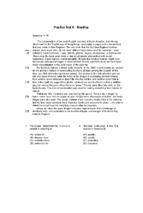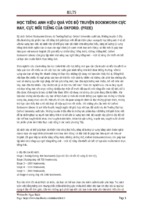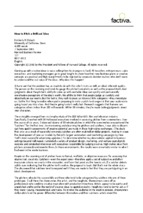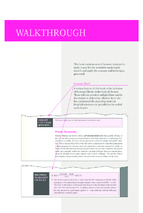A GUIDE TO THE WORLD’S
THOUGHT-LEADERS IN E-BUSINESS
Gurus include: Sergey Brin • Manuel Castells • Michael Dell
Peter Drucker • Esther Dyson • Bill Gates • Steve Jobs • Kevin Kelly
Gerry McGovern • Robert Metcalfe • John Naisbitt • Nicholas Negroponte
Larry Page • Linus Torvalds • Michael Porter • Thomas Stewart
Alvin Toffler • Niklas Zennström
John Middleton
GURUS ON
E-BUSINESS
JOHN MIDDLETON
Published in 2006 by
Thorogood Publishing Ltd
10-12 Rivington Street
London EC2A 3DU
Telephone: 020 7749 4748
Fax: 020 7729 6110
Email:
[email protected]
Web: www.thorogood.ws
© John Middleton 2006
All rights reserved. No part of this
publication may be reproduced, stored
in a retrieval system or transmitted in
any form or by any means, electronic,
photocopying, recording or otherwise,
without the prior permission of
the publisher.
This book is sold subject to the condition
that it shall not, by way of trade or
otherwise, be lent, re-sold, hired out or
otherwise circulated without the
publisher’s prior consent in any form of
binding or cover other than in which it is
published and without a similar
condition including this condition being
imposed upon the subsequent purchaser.
No responsibility for loss occasioned to
any person acting or refraining from
action as a result of any material in this
publication can be accepted by the
author or publisher.
A CIP catalogue record for this book is
available from the British Library.
PB: ISBN 1 85418 386 9
Cover and book designed and typeset in
the UK by Driftdesign
Printed in India by Replika Press
Special discounts for bulk
quantities of Thorogood books
are available to corporations,
institutions, associations and
other organizations. For more
information contact Thorogood
by telephone on 020 7749 4748, by
fax on 020 7729 6110, or e-mail us:
[email protected]
The author
John Middleton is Co-Director of the Centre for Strategic Thinking,
a membership-based organization that exists to promote better
quality thinking and planning practices within UK companies. Recognized as a leading expert in decision-making tools and processes, he
specializes in working with individuals and organizations that are determined to make best use of the future.
From 1996 until 2004, he was Director of the Bristol Management
Research Centre, before which he spent 18 years working for BAA
(formerly the British Airports Authority) and AXA Sun Life in various
senior HR roles, covering recruitment, training, management development, information systems and HR strategy.
John is a Chartered Member of the Institute of Personnel and Development, as well as a member of the Institute of Directors.
He holds a Masters Degree from the University of Bristol, where he
has been an Associate Lecturer since 1994. He has taught IT Management on Manchester Business School’s International MBA programme
since 2001.
He has written 11 books to date, including Writing the New Economy
(Capstone, 2000), The Ultimate Strategy Library (Capstone, 2003),
Culture (Capstone, 2002), and Upgrade Your Brain (Infinite Ideas, 2006)
From 1996 to 2002, he published and edited Future Filter, a bi-monthly
business digest covering trends and developments in the new
economy.
His email address is
[email protected]
THE AUTHOR
iii
Blank
Contents
Acknowledgements
1
The scope of this book
2
Introduction
3
ONE
TWO
THREE
The influence of technology
4
Summary
6
E-business – the strategic dimension
7
The internet offers huge scope for cost-cutting
9
The hare, the tortoise and the internet
9
Internet only companies carry less
organizational baggage
10
He who pays the piper…
10
The rise and fall of the middleman
11
Internet-based alliances
11
The simple conclusion – strategy has an e-dimension
13
E-business – the global dimension
15
Let’s stick together: the importance of clusters
19
E-business – the organizational dimension
23
The internet and organizations
24
The rise of the cyber cottage industry
29
CONTENTS
v
FOUR
vi
The e-business gurus
31
1
Tim Berners-Lee
33
2
Jeff Bezos
37
3
Frances Cairncross
40
4
Manuel Castells
44
5
Jim Clark
48
6
Michael Dell
51
7
Larry Downes & Chunka Mui
54
8
Peter Drucker
58
9
Esther Dyson
63
10 Philip Evans & Thomas Wurster
66
11 Carly Fiorina
69
12 Bill Gates
72
13 William Gibson
75
14 Andy Grove
78
15 Michael Hammer
82
16 Jonathan Ive
86
17 Steve Jobs
89
18 Kevin Kelly
92
19 Ray Kurzweil
97
20 Charles Leadbeater
101
21 James Martin
104
22 Gerry McGovern
106
23 Regis McKenna
110
24 Robert Metcalfe
113
25 Paul Mockapetris
116
26 Geoffrey A. Moore
118
27 Gordon Moore
122
28 John Naisbitt
125
GURUS ON E-BUSINESS
FIVE
29 Nicholas Negroponte
128
30 Larry Page & Sergey Brin
130
31 Jeff Papows
133
32 Don Peppers & Martha Rogers
136
33 Michael Porter
141
34 David S. Pottruck and Terry Pearce
144
35 Thomas Stewart
148
36 Alvin Toffler
152
37 Linus Torvalds
155
38 Meg Whitman
158
39 Niklas Zennström
161
40 Shoshana Zuboff
164
Case studies
167
e-Bay
172
Encyclopaedia Britannica
173
Seven-Eleven Japan
175
Vermeer Technologies
177
Best practice: pulling it all together
181
SIX
Annotated bibliography
183
SEVEN
Tracking e-business trends
209
EIGHT
An e-business glossary
215
CONTENTS
vii
Blank
Acknowledgements
I would like to thank
The ‘Friends of e-Business’ – colleagues, acquaintances and chums
– whose advice, tips, and comments about which e-business gurus
should be featured here (and, just as crucially, who in their view didn’t
merit a place) helped me to end up with a final list that was a vast
improvement over my initial attempt. The final decision though about
what went in was mine, so I alone deserve it on the chin for any howlers,
omissions, or glaring errors of judgment.
My fellow Co-Director at the Centre for Strategic Thinking Bob Gorzynski, whose regular pearls of wisdom have enhanced my understanding
of business strategy and of the e-business environment.
Finally, I could not have written this book without the support of my
wife Julie, particularly in the final days of writing. Thanks also to our
children Guy and Helena who, if they ever think about e-business when
they are older and forging their own careers, will probably wonder
what all the fuss was about. To you all with love.
ACKNOWLEDGEMENTS
1
The scope of this book
This book explores the impact and significance of e-business as illustrated by the work and thinking of a number of key players in the
field. Its aim is to be an accessible guide aimed at business people
who are looking to make optimal and profitable use of e-business, as
well as at students and others who are looking for a deeper understanding of the subject.
2
GURUS ON E-BUSINESS
Introduction
We thought the creation and operation of websites
was mysterious Nobel prize stuff, the province of
the wild-eyed and purple-haired. Any company,
old or new, that does not see this technology as
important as breathing could be on its last breath.
JACK WELCH, FORMER CHAIRMAN OF GENERAL ELECTRIC, QUOTED IN THE
OBSERVER, 14TH MAY 2000
In truth, we have never experienced anything quite like the internet.
Other great transformative technologies – railways, electricity, the
telephone, the motor car, and so on – took decades to achieve the
level of impact that the internet has achieved in just a handful of years.
The new information technologies that brought countless dot.com
businesses into being have created a global market place, restructured whole industry sectors, challenged conventional economic
thinking, redefined how business is done, and impacted to varying
degrees on every worker on the planet.
Peter Drucker, as ever, has captured this phenomenon in a few choice
words: ‘The traditional factors of production – land, labour and capital
– are becoming restraints rather than driving forces… Knowledge
has become the central, key resource that knows no geography. It
underlies the most significant and unprecedented social phenomenon of this century. No class in history has ever risen as fast as the
blue-collar worker and no class has ever fallen as fast. All within less
than a century’.
INTRODUCTION
3
This unprecedented speed of change has inevitably led to organizations having to learn on the hoof, with little time possible for
considered reflection. The result has been organizational carnage, with
a huge increase in the number of job losses and business failures over
the past few years. For many organizations, the internet has proved
to be more of a graveyard than a gravy train.
The influence of technology
Here are just a few of the ways in which technology has changed the
way that organizations and their people work:
Instant global news, instant global impact
News, ideas and information travels faster. Profits at investment banks,
airlines, and the wider tourist industry collapsed in the immediate
aftermath of America’s terrorist attacks. Lay-offs and job cuts
followed rapidly.
Geography matters less
Location is becoming a less important factor in business decisionmaking. Companies are locating screen-based activity wherever they
find the best deal in terms of skills and productivity. Developing countries increasingly perform on-line services – running call centres,
writing software, and so on.
Nine to five becomes 24/7
Companies now organize certain types of work in three shifts according to the world’s three main time zones: the Americas, East
Asia/Australia and Europe. The ‘working day’ has no meaning in a
global village where electronic communication can happen at any time
of day or night.
4
GURUS ON E-BUSINESS
Size matters less
Small companies can now offer services that, in the past, only giants
could provide. What’s more, the cost of starting new businesses is
declining, and so more small companies will spring up. Many companies will become networks of independent specialists, more employees
will therefore work in smaller units or alone. Individuals with valuable ideas can attract global venture capital. Perhaps one of the most
telling features of the e-business is that increasing numbers of people
can describe themselves without irony as one-person global businesses.
Customer service is changing
Enquiries and orders handled over the telephone today can be
managed over the internet as a matter of course, at a considerably
lower cost. In the US, it costs $1 to process a typical bank transaction in the conventional way; on the internet, the cost is just one cent.
Short-term focus becomes even shorter
Institutional investors and brokers’ analysts have become very
demanding of public companies. In the United States in particular,
they relentlessly demand an improvement in results every quarter.
Fail to deliver against this expectation and top managers are out,
regardless of their past track record. Against this backdrop, companies have become reluctant to make long-term investments for fear
of damaging their short-term results.
The internet levels the playing field
Companies which believe that flashy internet start-ups cannot
threaten their core activities built up over years of careful planning,
research, branding and marketing are wrong. The internet is helping
to put small agile newcomers on a par with large corporations and
are able to compete head on with them for new business.
INTRODUCTION
5
People as the ultimate scarce resource
The key challenge for companies will be to hire and retain good people,
extracting value from them, rather than allowing them to keep all the
value they create for themselves. A company will constantly need to
convince its best employees that working for it enhances each individual’s value.
Summary
In this chapter, I have argued that the tendrils of the new e-business
economy stretch wide and deep. The new information technologies
that have brought dot.com businesses into being are simultaneously
restructuring global markets and whole industry sectors, challenging conventional economic thinking, redefining how business is done,
and impacting to varying degrees on every worker in the global market
place.
Businesses are having to change – and change radically – in order to
compete effectively in the web-based era: but the good news is that
technological advances are opening as many windows of opportunity as they are threatening to close obsolete and outmoded ones.
Successful organizations will be those who come fully to terms with
the dynamics of a borderless 24/7 market place.
6
GURUS ON E-BUSINESS
ONE
E-business – the strategic
dimension
In periods of transition such as the one we have
been going through, it often appears as if there
are new rules of competition. But as market forces
play out, as they are now, the old rules regain
their currency. The creation of true economic
value once again becomes the final arbiter of
business success.
MICHAEL PORTER, WRITING IN HARVARD BUSINESS REVIEW, MARCH 2001
Many have argued that the introduction of the internet into business
practices renders the old rules of strategy and competitive advantage obsolete. According to Harvard Business School professor
Michael Porter, the opposite is true: ‘The only way [for companies to
be more profitable than the average performer] is by achieving a
sustainable competitive edge – by operating at a lower cost, by
commanding a premium price, or by doing both.’
The internet tends to weaken industry profitability without providing proprietary operational advantages, it is therefore more important
than ever for companies to distinguish themselves through strategy.
The winners will be those that view the internet as a complement to,
not a cannibal of, traditional ways of competing.
ONE E-BUSINESS
– THE STRATEGIC DIMENSION
7
Many of the early internet pioneers, both the newly minted dot.coms
and those well-established companies seeking an online presence,
have competed in ways that violate nearly every principle in the strategy rule-book. As Porter puts it: ‘Rather than focus on profits, they
have chased customers indiscriminately through discounting, channel
incentives, and advertising. Rather than concentrate on delivering
value that earns an attractive price from customers, they have
pursued indirect revenues such as advertising and click-through fees.
Rather than make trade-offs they have rushed to offer every conceivable product or service’.
The good news is that it did not have to be this way – these were bad
strategic choices but they were not the only options available. And
these choices had little to do with the inherent business potential of
the internet.
In fact, when it comes to reinforcing a distinctive strategy, Porter maintains that the internet provides a better technological platform than
any previous generation of IT.
For most existing industries and established companies, the internet rarely cancels out important sources of competitive advantage;
if anything, it is more likely to increase the value of those sources.
But over time, says Porter, the internet itself will be neutralized as a
source of advantage as all companies embrace its technology.
At which point, we may well see a return to the good old days when
competitive advantages will once again explicitly derive from traditional strengths such as unique products, proprietary content and
distinctive physical activities. Internet technology may be able to fortify
those advantages, but it is unlikely to supplant them.
The message, then, is clear. Gaining competitive advantage in the postinternet business world does not require a radically new approach
to business; and it certainly does not require the abandonment of classic
economic principles that can still offer strategic value in a market place
that depends on cutting-edge information technology
8
GURUS ON E-BUSINESS
No, gaining competitive advantage in the early years of the 21st century
is still reliant on applying proven principles of effective strategy.
Sources of strategic advantage rest where they always have – in cost
competitiveness, product differentiation, ease of entering and exiting
markets, and so on. The significance of the internet is in how it can
impact on these traditional battlegrounds. Here are some examples:
The internet offers huge scope for
cost-cutting
General Electric now does more business on its own private online
market place than all the public B2B exchanges put together. Siemens
hopes to cut its annual costs in the medium term by 3-5%. And there
is room for more. One estimate quoted recently in The Economist puts
the cost of e-procurement per order placed for routine office
purchases at only 10% of physical procurement costs. Low-cost airlines
like Ryanair have slashed their costs by using the internet to dispense
with the need for tickets and to cut out travel agents. To date, only a
minority of companies have got to grips with the cost-saving potential of the net. A 2001 survey by the National Association of
Manufacturers found that only around 30% of American manufacturers were using the internet to sell or procure products or services.
The hare, the tortoise and the internet
Another myth, disputed by Michael Porter et al., is that the internet
offers huge ‘first-mover’ advantages. However, companies that took
to the internet relatively late and with some caution don’t necessarily seem to have suffered: if anything, they seem to have gained from
being able to avoid the mistakes and the huge spending of the pioneers.
The fate of many internet retailers has shown that established
ONE E-BUSINESS
– THE STRATEGIC DIMENSION
9
companies can catch up relatively easily. The contrast between
Britain’s biggest supermarket chain, Tesco, selling its e-buying
system to America’s Safeway and the collapse of Webvan, the most
ambitious and best-capitalized online grocery chain, is instructive.
There is also a strong suggestion that the internet could well be lowering, not raising barriers to entry.
Internet only companies carry less
organizational baggage
The big boys aren’t having it all their own way. The arrival of new,
internet-based firms that are more agile and innovative than the giants
is shaking up whole industries and business sectors. Without question, the internet is helping to put some small agile newcomers on a
par with large corporations and letting them compete head on with
them for new business. Just as Microsoft came from virtually nowhere
to usurp the market of mighty IBM, so a few years later Netscape
appeared overnight and threatened to undermine the market (and
the size) of Microsoft. Who will be next? And where will they come
from?
He who pays the piper…
Another consequence of the growth of the internet as a business
medium, says Robert Baldock in his book The Last Days of the Giants?,
has been a shift in power from the seller to the buyer. According to
Baldock, ‘the convergence of computing, communications and
content in the shape of personal computers (PCs) hooked up over a
network to the internet has triggered a revolution in the way business is conducted. Users of these technologies have 24 hour access
to almost everything, everywhere’.
10
GURUS ON E-BUSINESS
The rise and fall of the middleman
Part of the paradox of the internet is that intermediaries are blessed
under one business model and cursed under another.
On the positive side, internet-based search agents make it possible
for these users to track down the cheapest products in seconds, and
new internet-based intermediaries (the so-called ‘Infomediaries’) have
created a new form of commerce whereby the buyer sets the price,
not the seller.
On the other hand, according to the ‘cursed’ theory, information technology puts producers directly in contact with their customers,
collapsing the distribution chain, wiping out all those who have made
their living by taking orders or breaking big lots into smaller lots. A
spooky technical term has been coined for this process: disintermediation. ‘Middleman functions between consumers and producers are
being eliminated,’ the futurist Don Tapscott wrote in the influential
best-seller The Digital Economy. Patrick McGovern, chairman of International Data Group, the world’s largest high tech publisher, is even
more dour. ‘The intermediary is doomed,’ he wrote in Forbes ASAP.
‘Technology strips him of effectiveness.’
Internet-based alliances
The internet and digital media open up new ways to create wealth.
Companies like Schwab, eBay, Cisco, MP3 and Linux have transformed
the rules of competition in their industries by making revolutionary
offerings to their customers. They did not achieve this alone: combining with like-minded partners with complementary skills was the key.
In their book Digital Capital, Tapscott, Ticcoll and Lowy call these internet-based partnerships or alliances ‘business webs’, or ‘b-webs’ for
short. A b-web, according to the authors, is ‘a distinct system of suppliers, distributors, commerce services providers, infrastructure providers
and customers that use the internet for their primary business
ONE E-BUSINESS
– THE STRATEGIC DIMENSION
11




















